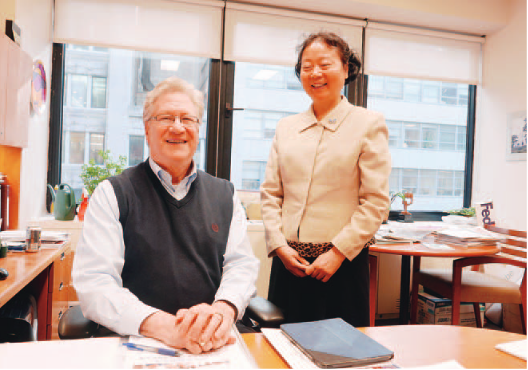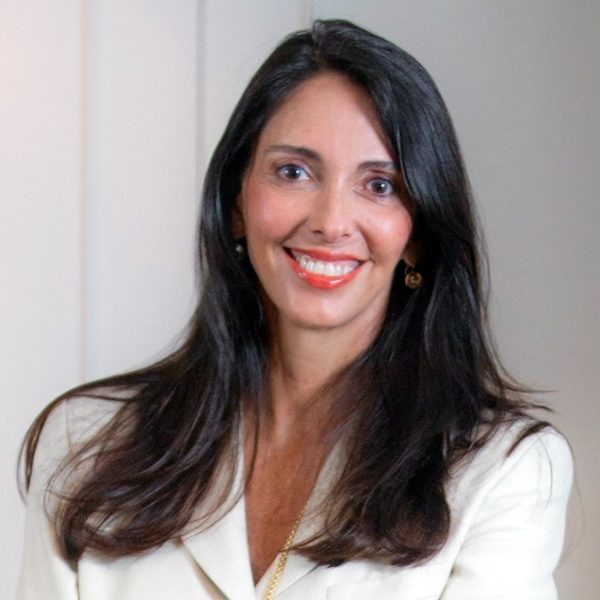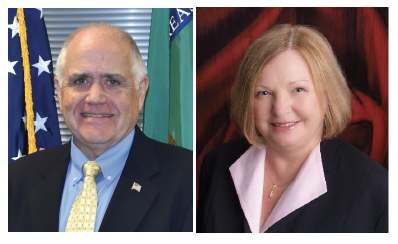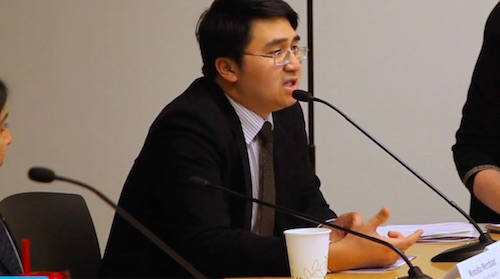Part 1. Read Part 2 here and the the original Sing Tao Daily stories in Chinese here.
Photo: CaringKind arranges tea parties, such as the one shown above, for dementia patients and their caregivers.
For Lian’s Grandpa, 87, seeing an airplane can set him shouting in Chinese, “Run for your life! The Japanese bombers are coming!” His dementia brings his mind back to being on the run during Japan’s World War II occupation of China. Lian’s Grandma also suffers, unable to bring her husband back to the present. A geriatric psychiatrist prescribed heavy medications, which diminish his anxiety–but make him look lost.
“Dementia is a 21st century human catastrophe,” says Jed Levine, executive vice president of CaringKind, formerly New York City’s Alzheimer’s Association chapter. “It makes many families live in fear and helplessness; it takes up a huge amount of resources of the government.”
Noting there is currently no cure for dementia, Levine said, “The science and medical community is eager to find solutions to delay its symptoms. At the same time, we need to deal with the consequential social and family issues.”
——————————————————————————————————————————————————————————————————————–
* Ling lived in a small Upstate New York town where her loving family of devoted Christians regularly took the dementia patient to church, where she could make friends and expand her life circle. But during a church picnic, she wandered away. Despite an intensive search, police did not find her for two days. Unable to swim when she fell into a lake, she drowned only a half-mile away.
———————————————————————————————————————————————————————————————————————-
Worldwide there are 46.8 million people with Alzheimer’s or a related dementia, according to the Alzheimer’s Disease International’s World Alzheimer’s Report 2015, with a total cost that will hit $1 trillion in 2018, about one-fourth of which is in the United States.
Globally, almost half of the cases today (22.9 million) are in Asia, with 9.4 million in the North America. The world number will almost triple to 131.5 million by 2050, says the report.
The U.S. Centers for Disease Control and Prevention reports that dementia is currently the sixth major cause of death in this country overall. But past age 65, one-in-three people who die have some form of dementia. The Alzheimer’s Association notes that last year, 15 million family caregivers in the U.S. provided over 18 billion hours of unpaid care–values at $220 billion. That’s far less that the $154 billion Medicare and Medicaid will pay this year for dementia-related care.
One in nine people age 65 in the U.S. has Alzheimer’s or another form of dementia–and the proportion jumps to one of every two people after age 80 people. The typical dementia patient is 82 among women, and 79 for men.
The estimated dementia population in New York City is about 250,000; approximately 14 percent of them are of Asian or Pacific Islander heritage.
Researching Causes and Needed Care
As dementia become more prevalent with the rapid aging of the United States population, Levine said, pressure is also increasing for advances in biomedical research from both government and private organizations, such as the Alzheimer’s Association–a major sponsor of studies.
Research and development of new medical treatments is of key importance, said Levine, but an even more pressing need is providing physical and mental-health assistance to patients and care providers.
He observed, “Both kinds of needs are engaging in a desperate tug of war. Finding out the cause of the disease and providing care to the patients are equally important. In the face of the disastrous surge of the disease, we cannot slow down our pace. We must find a solution.”
———————————————————————————————————————————————————————————————————————–
* Once, when Yao, 57, was bathing her dementia-care client of 79, the man mistook her as his late wife and declared he wanted her to “make love with me right now.” Frightened, Yao contacted the man’s family and her homecare company. The man, unable to recall what he’d said, felt unjustly accused. For her safety, Yao wants a family member of the man there when she bathes him. However, most like most Chinese people, they work and can’t be around every day.
————————————————————————————————————————————————————————————————————————
With headquarters near Grand Central station and centers in all five New York Boroughs, CaringKind also collaborates with local medical facilities to meet the needs caregiving needs of diverse populations.
Levine explained that those having a dementia patient at home understand that providing “loving care” isn’t easy. The brain disease can affect a patient’s personality, such as turning a once gentle person into an alienated family member.
Some–but not all–may become violent at times, sink into a depressed sense of loneliness, become paranoid, experience mood swings, and as the disease progresses become unable to care for themselves. Add signs of frailty, such as bowel or urinary incontinence, to the mental issues, and family members often find themselves desperate for help.
Many people become so physically and emotionally exhausted as they care for their spouses with dementia that it is not uncommon for them to predecease those they care for.
————————————————————————————————————————————————————————————————————————
* A new immigrant family moved into New York’s Chinatown. While the husband and wife worked and their children went to school, the Grandmother, age 76, stayed home alone. After the onset of dementia she forgot things–such as to turn off the stove. Once the grandchildren came home in time to avoid a fire. Not knowing where to find help, the Grandmother’s son gives her $10 every day for activities at the senior center. But he took away her house key, making her sit in nearby Columbus Park after the center closes until family members return home. Rainy days are especially slow for her.
———————————————————————
Levine said CaringKind provides its services for free so that patients’ families are not deterred for seeking help due to limited finances. Among the range of services is a 24-hour telephone hotline with multiple language support.
The group also provides patients with a 24-hour, seven-day emergency response service through MedicAlert including an identification bracelets and community-support network to locate those who wander off on their own. In addition, CaringKind helps patients and their transfer the person’s financial responsibilities and provides caregiver training workshops.
The organization currently has 90 monthly support groups across the city, each directed by a social worker. Three groups for Chinese caregivers are located in Chinatown, Brooklyn and Flushing. They allow the participants to share their personal issues, and provide emotional support and information.

Seeing special needs in the Chinese community, CaringKind has hired a bilingual social worker. A new Chinese language caregiver-training course will be available this coming fall to help non-English-speaking Chinese people learn how to provide care for dementia patients.
This two-part series is adapted from a longer article presentation published in the Chinese language in Sing Tao Daily (New York). Lotus Chau wrote the articles with support from the Journalists in Aging Fellowships, a program of New America Media and the Gerontological Society of America, sponsored by the Silver Century Foundation.
The Science of Dementia Today and Tomorrow
Clara Li, PhD, is one of the few geriatric neuropsychologists in New York. They are specialists more able to ensure that elderly dementia patients get the right treatment and medications because of their dual training in neurology and psychological disorders.
An assistant professor at Mount Sinai Medical School’s Alzheimer’s Disease Research Center, Li said she was inspired devote the extra 10 years earning her doctorate to do this medical research when she saw her vibrant grandmother decline from dementia.
Mount Sinai established its Hispanic dementia research project in 2014, and an Asian dementia research project in 2015. Li, who speaks English, Cantonese and Mandarin, is a rare multilingual researcher and professor in the Asian study.
Li noted that there are so few specialists in her field because additional the training in two fields requires a decade beyond basic medical-research education. As the dementia population increases because of longer life expectancy, she said, the number of doctors is not meeting the need for their care.
The most common type of dementia is Alzheimer’s disease, accounting for more than half of diagnosed cases. Among others are vascular dementia, about a quarter of case), Lewy Body disease (nearly 15 percent), frontotemporal dementia. Additional causes may be Parkinson’s disease, stroke, cancer, certain infections or even clinical depression.
Li emphasized that dementia is a disease, not a phenomenon of normal aging. Many families think patients are only forgetful or stubborn. Mistakenly believing dementia is natural in old age, many fail to seek medical treatment. Dementia involves not only a collection of symptoms, such as memory loss, but also affects other cognitive functions including language skills, spatial sense, arithmetic abilities, judgment, abstract thinking and attentiveness.
A patient’s functions generally degrade resulting in disruptive behavior, personality changes, delusions or other symptoms. Older people may also experience changes in their mental state, for example, from medications, surgery, infections, lack of sleep, or even an emotional crisis, such as from the death of a spouse or moving from a family home.
Although older patients may be given a short mental-health questionnaire to assess whether they need further mental treatment, the exams are in English, casting doubt on their accuracy for Chinese speakers, even done through an interpreter.
As a result, Li said, Mount Sinai’s Icahn School of Medicine has been collaborating with Chinese hospitals in Beijing and Shanghai to develop an objective version the tests. She added, though, that complex variations among immigrant Chinese speakers in the U.S., for instance, in northern or southern dialects–which even have different words for “potato”– might cause inaccurate cognitive test results.
At present, Li said, there is no cure for dementia. Doctors often prescribe drugs that may temporarily enhance memory and calm the patient, but these treatments offer limited help. Current drugs do not slow brain degradation.
For those with dementia and their caregivers, some ways to improve their quality of life are doing exercises, listening to music, improving patients’ living environments or changing their diet.
Although there is no cure for the disease today, Li stated, researchers are working hard to discover the causes and to develop drugs. Her research center has identified the bad protein in brain cells that lead to some symptoms. The center is constantly engaging in clinical trials to test drugs that could counteract this protein. She noted that if a drug “cocktail” can increase life expectancy of AIDS patients, scientists should remain optimistic about find a cure for dementia.
–Lotus Chau











